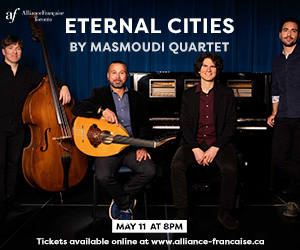Not so many years ago in real time, Sir Adrian Boult was a name known to concertgoers and record buyers and those who were up on the music scene. Today his name is almost unfamiliar, although his recorded performances are still highly thought of (by those who think of them at all) and even HMV, the company for whom he recorded exclusively during the 1930s and well into the post-World War II era is no more. The decline and fall of The Gramophone Company, once the greatest recording company in the world, the company that owned HMV, Angel, Columbia, Parlophone, Capitol, et al, is a cautionary tale but not an uncommon one. Adrian Boult was born in the north of England in 1889 to a well-to-do family who supported him in his interest in music. As a youth studying in London, he attended concerts between 1901 and 1908 where he heard such luminaries as Debussy, the already famous Richard Strauss, Henry J. Wood and Arthur Nikisch among many others. Still a schoolboy, he met Edward Elgar with whom he enjoyed a lifelong friendship and whom he would later champion. Attending the Leipzig Conservatory in 1912 and 1913 he was indelibly impressed by the precision of Nikisch’s conducting technique, although not by his interpretations. Boult’s first professional public concert was on February 27, 1914 with members of the Liverpool Philharmonic Orchestra. Eclectic hardly describes the program… works by Bach, Mozart, Schumann, Wagner, Hugo Wolf and George Butterworth plus, for an abundance of riches and likely the star attraction, Mrs. Hamilton Harty, the deservedly acclaimed soprano Agnes Nicholls, who sang arias by Mozart and Verdi.
Boult’s repertoire was vast but he was regarded by many as merely a British conductor of British music.
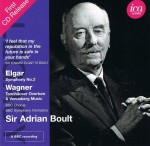 A new CD from ICA Classics contains two previously unissued performances, a live Elgar Second Symphony from the Royal Albert Hall on July 24,1977 and a BBC studio recording of the Overture and Venusberg Music from Tannhäuser, both with the BBC Symphony plus the BBC Chorus in the Tannhäuser (ICAC 5106). By 1977, Boult had recorded the Elgar five times, beginning in 1944, and this was to be his last performance. This is no fading reading of a score that he knew so well. The tempi are alert and vital, often more telling than in the recordings. The orchestra, his orchestra from 1930 to 1950, plays their hearts out for him. With all this in mind, listening now is quite an experience. The Tannhäuser music is essentially a live performance given in the BBC’s Maida Vale Studio 1 on December 8, 1968. It is an intense, reverent reading befitting the noble subject matter and the antithesis of the pomposity favoured by some. You may not be aware of this until you don’t hear it. The Venusberg ladies are warmly enticing. Arguably, these may be the best versions around of both works. Excellent sound throughout.
A new CD from ICA Classics contains two previously unissued performances, a live Elgar Second Symphony from the Royal Albert Hall on July 24,1977 and a BBC studio recording of the Overture and Venusberg Music from Tannhäuser, both with the BBC Symphony plus the BBC Chorus in the Tannhäuser (ICAC 5106). By 1977, Boult had recorded the Elgar five times, beginning in 1944, and this was to be his last performance. This is no fading reading of a score that he knew so well. The tempi are alert and vital, often more telling than in the recordings. The orchestra, his orchestra from 1930 to 1950, plays their hearts out for him. With all this in mind, listening now is quite an experience. The Tannhäuser music is essentially a live performance given in the BBC’s Maida Vale Studio 1 on December 8, 1968. It is an intense, reverent reading befitting the noble subject matter and the antithesis of the pomposity favoured by some. You may not be aware of this until you don’t hear it. The Venusberg ladies are warmly enticing. Arguably, these may be the best versions around of both works. Excellent sound throughout.
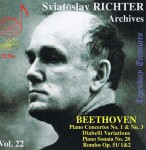 Curiously, the late piano superstar, Sviatoslav Richter (1915-1997) played only two of the Beethoven piano concertos, the First and the Third. Both works receive splendid performances, recorded live, on Volume 22 of Doremi’s ongoing treasury of Richter Archives (DHR-8022/3, 2 CDs). The First Concerto comes from 1963 with Kurt Sanderling conducting the Leipzig Gewandhaus Orchestra and from 1973 Rudolf Barshai and the Moscow Chamber Orchestra support Richter in the Third Concerto. Both find the pianist in remarkable shape delivering superb realizations of the two works. He is magnificent in the lyrical segments and dazzling in the faster passages. Altogether this is high voltage musicmaking with both conductors in tune with the soloist’s buoyant interpretations. This all-Beethoven set includes the Diabelli Variations, the Sonata No.28 and two Rondos, Op.51 all recorded at a recital on July 3, 1986 in Heide, Germany. Richter is in fine form with an unusually cohesive Diabelli.
Curiously, the late piano superstar, Sviatoslav Richter (1915-1997) played only two of the Beethoven piano concertos, the First and the Third. Both works receive splendid performances, recorded live, on Volume 22 of Doremi’s ongoing treasury of Richter Archives (DHR-8022/3, 2 CDs). The First Concerto comes from 1963 with Kurt Sanderling conducting the Leipzig Gewandhaus Orchestra and from 1973 Rudolf Barshai and the Moscow Chamber Orchestra support Richter in the Third Concerto. Both find the pianist in remarkable shape delivering superb realizations of the two works. He is magnificent in the lyrical segments and dazzling in the faster passages. Altogether this is high voltage musicmaking with both conductors in tune with the soloist’s buoyant interpretations. This all-Beethoven set includes the Diabelli Variations, the Sonata No.28 and two Rondos, Op.51 all recorded at a recital on July 3, 1986 in Heide, Germany. Richter is in fine form with an unusually cohesive Diabelli.
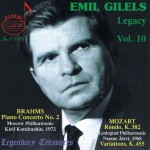 The other piano giant from the Soviet bloc of the era was Emil Gilels (1916-1985). Volume 10 (DHR-8000) of the ongoing Doremi series contains live performances of Brahms and Mozart. Brahms’ Second Piano Concerto was performed in 1972 with Kondrashin and the Moscow Philharmonic, four months ahead of the well-known recording with Eugen Jochum. I find that the chemistry between soloist, conductor and orchestra works far better under Kondrashin than it does with Jochum. Gilels’ approach is similar but the Moscow Philharmonic partnership brings more sizzle and support. Splendid mono sound. The two short Mozart gems are the Rondo K382 with Neeme Järvi and the Leningrad PO (1968) and the solo Gluck Variations K455 (Salzburg 1970). All performances are new to CD.
The other piano giant from the Soviet bloc of the era was Emil Gilels (1916-1985). Volume 10 (DHR-8000) of the ongoing Doremi series contains live performances of Brahms and Mozart. Brahms’ Second Piano Concerto was performed in 1972 with Kondrashin and the Moscow Philharmonic, four months ahead of the well-known recording with Eugen Jochum. I find that the chemistry between soloist, conductor and orchestra works far better under Kondrashin than it does with Jochum. Gilels’ approach is similar but the Moscow Philharmonic partnership brings more sizzle and support. Splendid mono sound. The two short Mozart gems are the Rondo K382 with Neeme Järvi and the Leningrad PO (1968) and the solo Gluck Variations K455 (Salzburg 1970). All performances are new to CD.
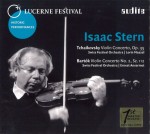 It is always a pleasure to find another Isaac Stern recording from his early years in the late 1940s and 50s. At that time his artistry and individual sonority made him an ideal performer of the classics, the romantic and the contemporary. He always had something special to say. He was perfect in every detail, the spontaneous aspect of his musicmaking was engaging, convincing and sweeping. One has to remember that Stern was rising to fame and influence at the time the violin world was overshadowed by Heifetz and Oistrakh, but hearing Stern was a special experience for me. He was the classical model of perfection as a soloist and a chamber musician (check out his Casals Festivals recordings). Examples of these qualities may be heard on an Audite CD (95.624) which has two live performances from the Lucerne Festival that I have been playing repeatedly since it arrived. The Tchaikovsky Concerto is conducted by Lorin Maazel (1958) and the Bartók No.2 by Ernest Ansermet (1956). These are performances to treasure.
It is always a pleasure to find another Isaac Stern recording from his early years in the late 1940s and 50s. At that time his artistry and individual sonority made him an ideal performer of the classics, the romantic and the contemporary. He always had something special to say. He was perfect in every detail, the spontaneous aspect of his musicmaking was engaging, convincing and sweeping. One has to remember that Stern was rising to fame and influence at the time the violin world was overshadowed by Heifetz and Oistrakh, but hearing Stern was a special experience for me. He was the classical model of perfection as a soloist and a chamber musician (check out his Casals Festivals recordings). Examples of these qualities may be heard on an Audite CD (95.624) which has two live performances from the Lucerne Festival that I have been playing repeatedly since it arrived. The Tchaikovsky Concerto is conducted by Lorin Maazel (1958) and the Bartók No.2 by Ernest Ansermet (1956). These are performances to treasure.



